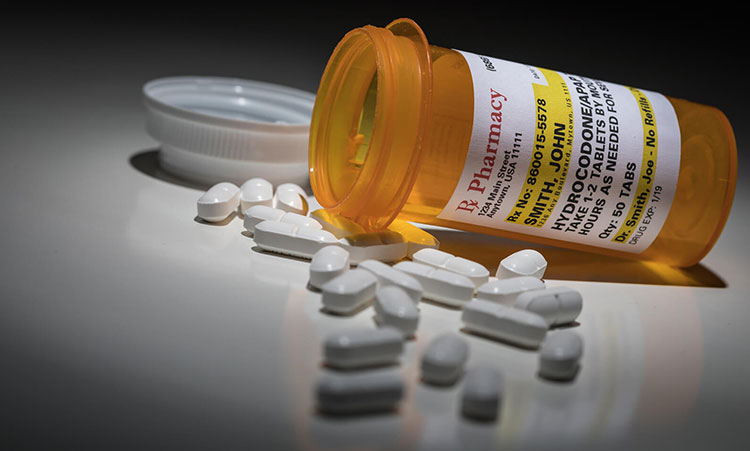
Is Hydrocodone a Narcotic? – Yes. Hydrocodone is a primary ingredient in narcotic painkillers indicated to treat moderate to severe pain. It is often administered orally on a short-term basis for pain related to injuries or following surgery. Sometimes it is used long-term to treat severe conditions such as cancer or end-of-life diseases.
Hydrocodone is an opioid and is similar to drugs such as morphine and oxycodone. Opioids are technically classified under the term “narcotic.” The narcotic definition pertains to a substance that can produce narcosis, which is defined as a state of stupor, drowsiness, or unconsciousness produced by drugs.
There are several versions of hydrocodone available in the United States. All except Zohydro also contain acetaminophen, the active ingredient in Tylenol. These version include include the following:
- Vicodin (5mg, 7.5mg, 10mg/300mg acetaminophen)
- Norco (7mg, 10mg/325mg acetaminophen)
- Lortab (5mg, 7.5mg, 10mg/325mg acetaminophen)
- Zohydro (10mg, 15mg, 20mg, 30mg, 40mg, 50mg)
What is Hydrocodone and How is it Used?
Hydrocodone alleviates pain by attaching to opioid receptors in the central nervous system. This action reduces pain signals in the brain and can also produce feelings of pleasure and relaxation.
Those who abuse hydrocodone may crush their pills and then snort or inject the remaining powder, or use it more frequently or in higher amounts than directed. Others obtain the drug illicitly by stealing it from a loved one’s medicine cabinet or buying it illegally on the black market.
People who use hydrocodone over a prolonged period, even as directed, or in excessive doses may start showing symptoms of a hydrocodone addiction.
Effects on the Body
When a person uses hydrocodone, the pain receptors in the brain are obstructed, and dopamine, a chemical responsible for feelings of pleasure and reward, floods the brain.
Common side effects of hydrocodone are:
- Dizziness
- Drowsiness
- Blurred vision
- Itching
- Headaches
- Constipation
- Nausea and vomiting
Addiction Signs and Symptoms
If you are concerned that someone you love is abusing hydrocodone or has an addiction, there are several signs and symptoms they may exhibit, including the following:
Behavioral Signs of Hydrocodone Addiction
- Dramatic mood swings
- Confusion
- Social isolation
- Doctor-shopping – visiting multiple doctors or pharmacies to obtain prescriptions
- Uncharacteristic deception or stealing
- Financial or legal problems
- Worsening performance at work or school
- Strained relationships
Physical Signs of Hydrocodone Addiction
- Dizziness
- Noticeable sedation or drowsiness
- Constricted pupils
- Nodding out or losing consciousness
- Apparent euphoria or elation
- Slowed respiration
- Constipation
Withdrawal Symptoms
As with any opioid, there may be uncomfortable and severe withdrawal symptoms when a person discontinues using the medication. A medical detox is recommended to keep patients comfortable throughout this challenging process, and effectively prevents relapse.
Hydrocodone withdrawal symptoms may include the following:
- Watery eyes and runny nose
- Body aches
- Irritability
- Difficulty sleeping
- Sweating
- Anxiety
- Abdominal cramping
- Nausea and vomiting
- Diarrhea
- Goosebumps
Signs and Symptoms of Hydrocodone Overdose
An overdose of hydrocodone can occur in either of the following situations: someone takes a dose that is too high for their body to process correctly, or they use hydrocodone in combination with other substances, including other prescription or illegal drugs or alcohol. In either case, a number of potentially dangerous effects are produced.
It is critical to identify an overdose as early as possible to get immediate medical help and prevent long-term brain damage or even death.
Symptoms of a hydrocodone overdose include the following:
- Vomiting
- Pinpoint pupils
- Low blood pressure
- Dizziness or lightheadedness
- Confusion
- Severely reduced, labored or stopped breathing
- Pale and/or clammy, cold skin
- Bluish color to lips and nails (cyanosis)
- Limpness, especially in extremities
- Unconsciousness or unresponsiveness
- Seizures
If a hydrocodone user exhibits any of the above symptoms, please call 911 right away. Healthcare professionals and emergency technicians are the best equipped to provide the care that is needed to treat and reverse an opioid overdose and prevent permanent damage or death.
Of note, many hydrocodone medications are combination products, containing acetaminophen, which can induce extensive liver damage in high doses, and lead to long-term or permanent functional impairments.
Get Treatment for Addiction
If hydrocodone abuse or addiction is controlling your life, it’s vital that you seek treatment as soon as possible. It may be necessary to undergo a medical detox and to enroll in a long-term inpatient or intensive outpatient treatment program.
Comprehensive treatment programs that include a variety of evidence-based services including psychotherapy, individual and group counseling, and group support are found to be most effective. Our center offers these services and our highly-skilled addiction professionals deliver them to our clients with care and expertise.
We provide clients with the tools they need to succeed at sobriety and sustain long-term physical and emotional health. We are committed to your recovery – contact us today and start receiving the help you deserve!